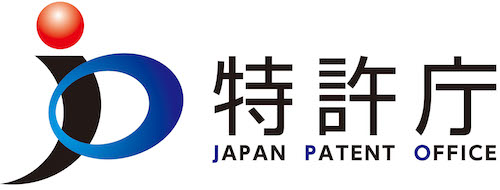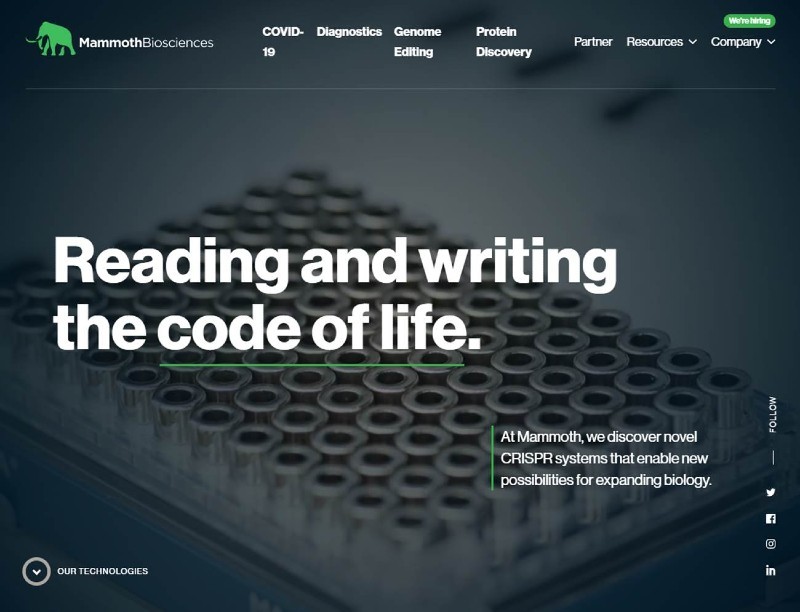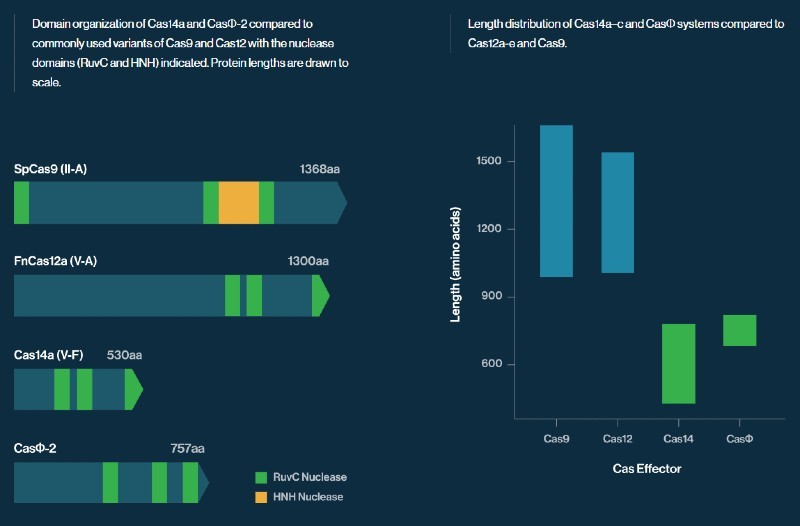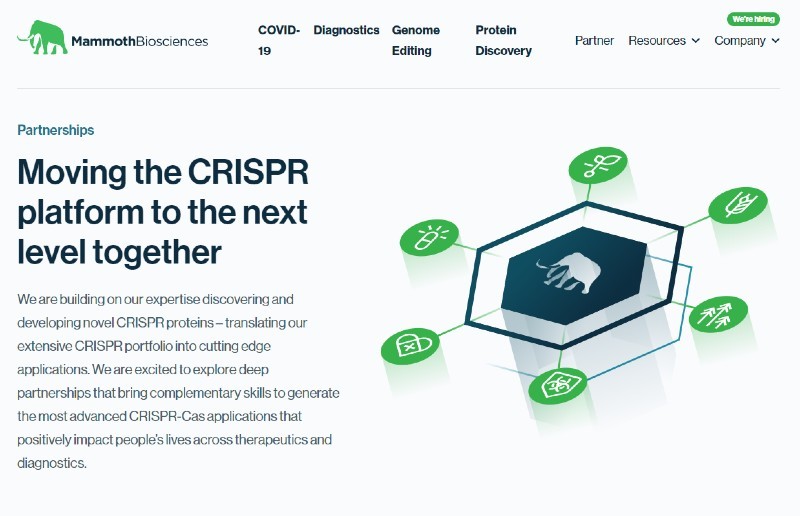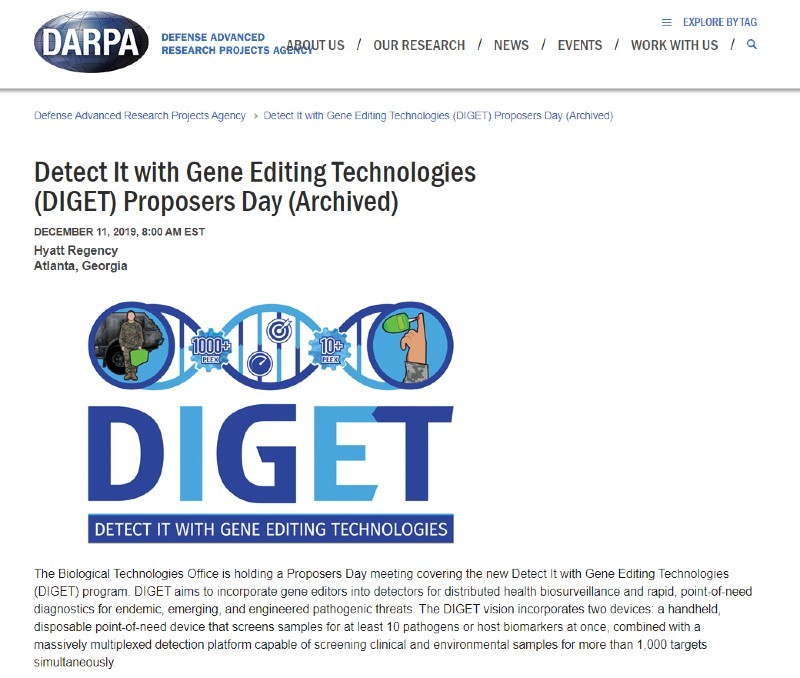IP BASE English Page
Mammoth Biosciences 最高事業責任者 ピーター・ネル氏インタビュー
「CRISPRは簡単に扱えるため、差別化が重要」ノーベル賞受賞者が共同設立したスタートアップに聞く技術と知財/“Differentiation is the key to making CRISPR easy to use,” Technology and Intellectual Property from a Startup co-founded by a Nobel Prize winner
2020年のノーベル化学賞を受賞した「CRISPR/Cas9」(クリスパー・キャスナイン)はゲノム編集の主要ツールとして知られている。創薬や治療などの医療応用で世界中の注目を集め、同技術で多くのスタートアップが誕生している。中でも、ノーベル賞を受賞したジェニファー・ダウドナ氏が創業者として名を連ね注目を集める企業であるMammoth Biosciencesの最高事業責任者 ピーター・ネル氏に、大野総合法律事務所 パートナーの弁理士・博士(医学)である森田裕氏が話を伺った。

Mammoth Biosciences 最高事業責任者 治療部門主任 ピーター・ネル(Peter Nell)氏:
バイオサイエンス業界で治験部門や事業開発部門の役職を歴任。2016年にCasebia Tx(Bayer HealthCareとCRISPR Therapeuticsの合弁会社)を共同創業した後、Mammoth Biosciencesの最高事業責任者および治療部門主任(Head of Therapeutics)に就任。CRISPR技術を活用した創薬の開発を主導するほか、遺伝子治療やゲノム編集に関する講演などへも多数登壇する。
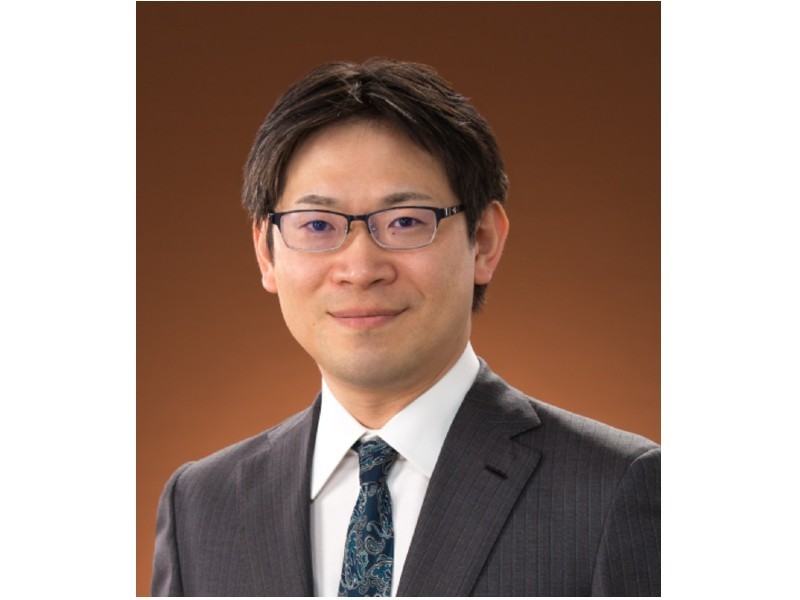
聞き手:大野総合法律事務所 パートナー 弁理士 博士(医学) 森田 裕氏
大野総合法律事務所にて知財訴訟および権利化に携わる。東京大学および筑波大学の橋渡し拠点の知財顧問を務めると共に日本発イノベーションの創出支援のためアカデミアやスタートアップの支援に力を入れている。平成28年及び30年には日本弁理士会バイオ・ライフサイエンス委員会委員長を務めた。有益な知財戦略について日経バイオテクオンライン「森田弁理士の特許“攻防”戦略」で広めている。
応用領域の広いCRISPR/Casシステムで遺伝子治療や診断を効率化
PCRに代わるCOVID-19テストキットの開発を目指す
「CRISPR」(Clustered Regularly Interspaced Short Palindromic Repeats)は、ウイルスなど外敵の侵入から身を守るための免疫系として働くDNA領域。CRISPRから生み出されるRNA分子を活用してウイルスなどの外敵のDNAに配列特異的に結合し、切断する酵素がCasヌクレアーゼである。Casヌクレアーゼ群を活用したゲノム編集技術であるCRISPR/Casシステムは、創薬や治療などの医療応用で世界中の注目を集め、多くのスタートアップが誕生している。Mammoth Biosciencesも、そのひとつだ。
Mammoth Biosciencesは、CRISPRのCas9酵素を発見した研究者のひとりとしてノーベル化学賞受賞者に名を連ねるカリフォルニア大学バークレー校教授ジェニファー・ダウドナ(Jennifer Doudna)氏が共同創業したスタートアップだ。2020年には4,500万ドル(約49億円)の大型の資金調達に成功。激化するCRISPR/Cas市場で存在感を見せている。
同社の事業は、治療分野と診断ツールの2つに大きく分けられる。
治療分野では、主に遺伝子疾患における新しい治療法の開発に取り組んでいる。将来的には遺伝子疾患だけでなく、発症リスク抑制における評価やリスク遺伝子の評価などにも展開できると、Mammoth Biosciencesの最高事業責任者および治療部門主任のピーター・ネル氏は述べる。
また診断ツールでは、血液や唾液、尿などから遺伝物質を検出する臨床現場即時検査(Point of care testing:POCT)および数百万レベルの大量の薬剤候補集団から望む作用を持つものを高速に選別するハイスループットスクリーニング(High Throughput Screening:HTS)の開発を進めている。中でも注力するプロジェクトが、PCRに代わるCOVID-19テストキットの開発だ。大規模かつ多様なメタゲノミクス・データベースに基づいて、新規のCRISPRシステムの発見を狙う。
「開発中のCRISPRテストキットでは、15分から20分以内に遺伝子配列を読み取ることができ、COVID-19被験者のサンプルに含まれる疾患関連配列を特定するHTSの一端が担える。感染を検出するうえで必要なウイルス量も、ごく少量で十分。また弊社では、妊娠検査に似たテストキット開発にも取り組んでいる。誰もが自分の鼻の粘膜や唾液をぬぐって、20分程度でウイルス感染の有無を判定できる使い捨てキットを提供できるかもしれない。しかもガイドRNAを変更すれば、他の感染症のための新しい検査にも対応できる」(ネル氏)
すでに英製薬会社グラクソ・スミスクライン(GlaxoSmithKline Consumer Healthcare)と共同開発を始めていると明かすネル氏は、バークレー校の知財をベースにCRISPR/CasシステムおよびガイドRNAの最適化に関する特許ポートフォリオを構築。特許出願も行っていると話す。
Mammoth Biosciencesが扱うのは、CRISPR/Cas14やCasΦ(ファイ)であり、Cas9ではない。Cas9に関わるカリフォルニア大学と米ブロード研究所との特許紛争や、それに関連した各国特許制度の異なる解釈に振り回されたくないという本音もあるようだ。
「他社の知的所有権に縛られることなく、発明に関するアクションを起こせるかどうか、いわゆるFTO(Freedom to Operate)は、今後の事業継続やパートナーシップとも絡む重要な議題だ。これについて、CRISPR/CasシステムはCas9の知財から完全に切り離されたものなので、実用化に向けての障害もない」
さらに、同社で使用されているCRISPRシステム、例えばCas14やCasΦには、いくつかの利点があるとネル氏は言う。「Cas14とCasΦは、Cas9よりも分化したメカニズムで機能するV型CRISPR-Casエフェクタータンパク質です。SpCas9のアミノ酸が1,380であるのに対し、Cas14は400~700、CasΦは750~850程度と、Cas9よりもはるかに小さい特徴をもつ。これにより、導入できるCasヌクレアーゼの大きさに制限がある場合でもデリバリー方法が可能になり、Cas9が適さないような新しい治療法につながる可能性があります」
もちろん、基本的な知財はバークレー校が所有する。そのため、同社の特許弁護士や研究者たちはバークレー校の特許弁護士と緊密に連携し、権利化方針に従って実務に落とし込み、必要な改善を実施。新しい発見については、新たに特許出願してポートフォリオの強化を図っている。
Mammoth Biosciencesにおいて、特許弁護士の存在は大きいという。現在、同社では特許弁護士をひとり抱えており、米国では外部の法律事務所と、欧州では専門会社と提携しながら法務処理をしている。CRISPR分野の特許を扱う法律事務所にいた人物で、CRISPR全般やCRISPR/Cas9について詳しいことが決め手だったという。
CRISPR技術は非常に簡単に扱えるため、差別化ポイントが重要
投資家やVC、大手企業との関係性も、スタートアップが飛躍する上で見極めが必要な部分だ。投資家やVCの存在について、ネル氏は「FTOと差別化部分をはっきり提示すること」が相手の投資判断で有効に働くと述べる。
「遺伝子関連市場の特許状況は、最初に上市することがより重要であり、特に希少疾患ではジェネリックとの競争はそれほど想定していない。たとえば低分子治療であれば、特許が切れる数年前からジェネリック医薬品の開発が始まり、存続期間が終了した瞬間、全社が全速力で市場展開にかかる。だがCRISPRの場合、特許が切れた後でも、製造上の課題や規制上のプロセスに高い要求があるため、あまり競争がないのではないかと推測している」(ネル氏)
ネル氏はそう分析しながらも、「誰もがFTOの不安定さを知っている。シードステージやシリーズAでは特許を公開していないところもあり、他の特許に妨害される恐れのあるまま出願した場合、特許が公開されるまでの期間である18ヶ月以内に公開されてしまう可能性もある」と指摘。そうした不安を払拭するために、VCなどはデューデリジェンスを通じて特許の保護状況やFTOをチェックするため、ネル氏らはその際に情報を提示できるよう、外部含めて専門家の意見を仰ぎ、差別化ポイントなどを整理していると話す。
特に、差別化ポイントが重要だと同氏は断言する。「CRISPR技術は非常に簡単に扱えるため、IPを持っていなくても、とりあえず採用しようという動きがある。Cas9の現状を見ればわかると思う。その意味で、IPの保護はとても重要だが、本当の価値は差別化を図れるかどうかにあると考える」(ネル氏)
また、大手企業などの他社との提携も、独自の対応が求められる。
現在同社は前述のとおり、グラクソ・スミスクラインと診断ツールの共同開発を進めるほか、ゲノム研究支援や幅広い特許ライセンスを管理する英Horizon Discovery(2020年12月に米Perkin Elmerが買収)と次世代の遺伝子改変CHO細胞株の開発における編集技術提供などで連携している。バークレー校から基盤となる知的財産を独占的にライセンス供与され、独自の改良や新しいシステム開発を行っているが、製薬会社やバイオテクノロジー企業との提携も検討しており、このような潜在的なパートナーシップにおいてはプロジェクト譲渡と、一方でプロジェクトを独自に商業化することの価値を維持することでのバランスが非常に重要だとネル氏は考える。
「どの特許を継続するか、どの国で資産を保護するかを決めることは重要な問題であり、時には関係者間で利害が異なることもあります」
ネル氏はそう述べながら、「たとえばどこかの国で申請した特許を維持するかどうか判断が迫られ、私たちは不要と思っても先方が維持すべきと主張したとする。このとき、維持コストをカバーすると提案があれば、維持の方向で再検討することも可能だ」とし、互いに交渉しながら落としどころを探ることも大切と指摘した。
どんなに困難な状況が発生しても、他企業とパートナーシップを組むことは良いことだとネル氏は捉える。
「パートナーシップを組むことは、関係性の複雑さや手続きの煩雑さを生む。たとえば、提携先と新しい知財を開発した場合、それを自社プロジェクトで使用したいと思っても、提携先の取引関係や提携の相手に弊社の競合他社がいると、難しい手続きが発生するだろう。それでも、これまでと異なる領域に進出する場合、大手パートナーの専門知識が加わることで、プロジェクトを前進させるのに役立つと考えられています。製造や規制におけるプロセスが良い例です」
あらゆる可能性を模索
Mammoth Biosciencesはこのほか、DARPA(米国防高等研究計画局)の「Detect It with Gene Editing Technologies」(超多重検出が可能な検査キットの開発を目指す)プログラムに参加し、1回で1,000件以上を同時検査するためのガイドRNAやプローブを開発するなど、研究にも余念がない。
「私たちのチームは、極めて多様なメタゲノム・データベースを適用して、新たなCRISPRタンパク質を探している。このデータベースは、氷河から火山、廃水から湖、人間から動物まで、あらゆる種類の特性を持つさまざまなソースから得られたサンプルで構築されている」(ネル氏)
この研究には、同社の科学顧問委員会の議長を務め、バークレー校の教授であり、Innovative Genomics Instituteの共同設立者でもあるダウドナ博士も従事している。
従業員に対しても、ストックオプションや特別な成果に対するスポットボーナス、特許出願時のボーナス、保険や確定拠出年金(401K)、年金基金、さらには「シリコンバレーのテック企業によくあるが、バイオテック業界では珍しい」無料ランチを提供するなど、働きたい環境作りにも真剣に取り組んでいる。ヴェスティング(Vesting※)についても、よく使われるベンチマークなどを参考にしつつ、一般的に従業員へ付与される株数を決定し、ステージが進むごとに評価を見直すなど柔軟に対応しているという。
※Vesting:ストックオプションを行使する時期についての制限を設けること。最初の権利(ストックオプションの25%など)を行使できるのは所属から1年後。約3~5年ですべての権利が行使できるのが一般的。
今後、M&AやIPOなど、どのようなイグジット戦略を展開するかは未確定とネル氏は言う。
「一般論だが、現在CRISPR市場はとても好調で、資金調達には絶好のタイミングにあると実感している。調達しやすく価値変動幅も広い現状だが、一方で投資家を納得させるためには、意味のあるデータやプロジェクト、カタリスト(catalysts)と呼ばれる、将来的に達成可能で会社に付加価値を与えるマイルストーンを持つこととのバランスをとる必要がある。従来、企業が株式を公開するのは、臨床開発を行っているときだけだったが、近年、この状況は変わりつつある。
思い切ってIPOするのも手だと思う。実際、臨床試験の2年前の段階にあるスタートアップがIPOを進めたケースもある。今のところ、株式会社になると株主への報告義務が発生する。まだ初期ステージにも関わらず情報を公開するのは、競合他社にも情報を公開することになるので、よく考えなければならない。また、投資家を誤解させるような間違った発言では、法的措置が取られる可能性もありうる」
日本のスタートアップ市場の変化に期待
ネル氏は、前職のCasebia在籍時に神戸大学を訪れ、株式会社バイオパレットのグループと話をしたことを特に覚えているという。「バイオパレットは、塩基編集の分野で非常に優れた技術を開発し、それを農業に応用していたが、一方で同様の技術を持つ米Beam Therapeutics社とクロスライセンスを結び、治療薬への応用を進めている。これは、日本におけるCRISPR分野での最先端研究の一例に過ぎない」と語る。
最後に、ネル氏は自身の出自と比較しつつ、日本のスタートアップ企業市場が今以上に花開くことへ期待を寄せた。
「米国のスタートアップは、リスクをとる。創業者が失敗しても、すぐに次へと目を向け、フットワーク軽く行動に移す。でも、少なくとも過去のドイツは違った。私はドイツ出身だが、ドイツでは失敗すると落伍者の判が押されるため、みんなリスクを避けがちだ。これは、ドイツ人と日本人の共通点であるように思う。だが、ドイツでもそんな状況が変化しつつあり、スタートアップも増えている。日本でも同様の変化が起きているだろう。日本には素晴らしい研究が多い。ぜひスタートアップには、柔軟かつスピード良く意思決定し、リスクを恐れずチャレンジしていってほしい。リスクを取らなければ、ブレイクスルーを起こすことはできない」(ネル氏)
CRISPR-Cas9, the winner of the 2020 Nobel Prize in Chemistry, is well known for being a major tool in genome editing. It has attracted worldwide attention for its wide applications in medicine, such as drug discovery and treatment, with many startups being born from this technology. Hiroshi Morita, Patent Attorney and Doctor of Medicine and Partner at OHNO & PARTNERS, spoke with Peter Nell, the Chief Business Officer at Mammoth Biosciences, whose founder is Nobel laureate, Jennifer Doudna.

Peter Nell, Chief Business Officer, Head of Therapeutics, Mammoth Biosciences:
Peter Nell is the Chief Business Officer and Head of Therapeutics at Mammoth Biosciences after co-founding Casebia Tx (a joint venture between Bayer Healthcare and CRISPR Therapeutics) in 2016. In addition to leading the new development of drug discovery using CRISPR technology, he is a frequent speaker on gene therapy and genome editing.

Interviewer: Yutaka Morita, OHNO & PARTNERS, Patent Attorney, Doctor of Medicine
Dr. Morita has had active participation in IP litigation and prosecution at OHNO & PARTNERS. He served as an IP advisor to the University of Tokyo and the University of Tsukuba as well as focusing on supporting academia and start-ups to inspire and stimulate innovation within Japan. In 2016 and 2018, Dr Morita served as the chairman of the Bio-Life Science Committee of the Japan Patent Attorneys Association. In his article series, “森田弁理士の特許“攻防”戦略” (Patent Attorney Morita’s Patent “Defense” Strategy) on Nikkei Biotech Online, he helped spread his helpful IP strategies.
Optimization of gene therapy and medical diagnosis using the widely applicable CRISPR/Cas System
Aiming to develop a COVID-19 test kit to replace PCR tests “CRISPR” (Clustered Regularly Interspaced Short Palindromic Repeats) is a DNA sequence with an immune adaptation mechanism to protect from invasive viruses.
Coinciding with genetic sequences that initiate upstream transcriptions, genome-editing technology that utilizes genetic clusters like the DNA-cleaving enzyme Cas has attracted worldwide attention for their medical applications such as drug discovery and therapy, birthing several related startups. Mammoth Sciences is among these startups. Mammoth Biosciences is a startup co-founded by Jennifer Doudna, a professor at the University of California, Berkeley. She was named a Nobel laureate in chemistry as one of the researchers who discovered the Cas9 enzyme in CRISPR. In 2020, the company succeeded in raising $45 million (~4.9 billion yen) in capital, making a prominent mark in the intensifying CRISPR/Cas market.
The company’s business operates primarily in two fields: therapeutics and diagnostic tools.
Within the therapeutics field, Mammoth Biosciences primarily operates in the development of new therapies for genetic diseases. Peter Nell, Chief Business Officer and Head of Therapeutics at Mammoth Biosciences, says that in the future, the company is looking at expanding its research beyond genetic diseases, to provide assessments of onset illness risk reduction and genetic risk factors.
As for diagnostic tools, the company is developing point-of-care testing (POCT) to detect genetic material in the blood, saliva, and urine. In addition, they are developing High Throughput Screening (HTS) to rapidly identify a disease-related sequence in subject samples with a large population consisting of millions of drug candidates. One of the projects being focused on currently is the development of a COVID-19 test to replace the PCR. The company is also discovering novel CRISPR systems, building on a large and diverse metagenomics database.
“The in-development CRISPR test kit can read gene sequences in 15-20 minutes, which is handled by the HTS process to rapidly identify disease-related sequences in samples, such as for COVID-19. Only a small amount of a virus is necessary for detecting infection. Mammoth Biosciences is also working on adapting the same chemistry being used in a single test device to allow for test kits similar to pregnancy tests. In this case, anyone would be able to determine the presence or absence of a viral infection in 20 minutes by swabbing their nasal mucus or saliva. What is more, if you change the guide RNA you can rapidly generate novel tests for other infectious diseases.” _- Dr. Nell.
The company has already begun co-development with the British pharmaceutical company GlaxoSmithKline Consumer Healthcare, Dr. Nell said, and is building a patent portfolio on the CRISPR Cas system and guide RNA optimization based on Berkeley’s intellectual property, with patent applications underway.
Mammoth Biosciences deals with CRISPR/Cas14 and CasΦ (CasPhi), not Cas9, and it seems they wish not to be swayed by the patent dispute between the University of California and the Broad Institute on Cas9 with the different interpretations of patents systems in other countries.
Freedom to Operate (FTO), the ability to take actions on inventions without being bound by the intellectual property of other companies, is an important issue that is related to future business continuity and partnerships. In this regard, the CRISPR/Cas systems used by Mammoth Biosciences are separate from Cas9’s intellectual property, meaning there should be no obstacles to commercialization.
Furthermore, the CRISPR systems used at Mammoth Biosciences, such as Cas14 and CasΦ have several additional advantages, says Dr. Nell, “Cas14 and CasΦ are type V CRISPR-Cas effector proteins that work via a differentiated mechanism than Cas9. Strikingly, they are much smaller than Cas9, e.g., SpCas9 with 1,380 amino acids vs. Cas14 in the range of 400-700 amino acids and CasΦ around 750-850 amino acids. This might enable delivery methods where the size of payload is restrictive and could lead to new therapies that Cas9 might not be suitable for.
Of course, the foundational intellectual property is owned by Berkeley. Therefore, the company’s patent attorneys and researchers work together closely with Berkeley’s own patent attorneys to make the necessary revisions ensuring adherence to any rights policies. Whenever new discoveries are made, new patents are filed to strengthen their portfolio.
At Mammoth Biosciences, the presence of patent attorneys is significant. Currently, they employ one patent attorney who works closely with external firms within the US and with a specialized company in Europe to handle legal processes. She previously was employed by a law firm that handled patents in the CRISPR space and was also a Professor for Law at a US University. Her in-depth knowledge of CRISPR as well as CRISPR/Cas9, in particular, was a winning move for her joining the team.
CRISPR technology is easy to handle, so differentiation is vital
Relationships with investors, VCs, and major companies are also areas that startups need to identify to take off. Regarding the presence of investors and VCs, Dr. Nell said that “clearly presenting differences from the FTOs” will be effective on investment decisions.
“The patent situation in the gene-related market is more critical of being the first to market, especially in rare diseases. Competition from generic competition is not expected as much. For example, in the case of small-molecule therapy, the development of generic drugs starts several years before the patent expires. The moment the patent expires, companies will begin to develop the market at full speed. In the case of CRISPR, however, I assume that there will not be much competition after the patent expires due to high requirements in manufacturing challenges and regulatory processes.” – Dr. Nell.
While analyzing this, Dr. Nell pointed out that, “Everyone knows that FTO is important but difficult to access for early-stage research. Some of the seed stage and series A companies have not released their patents, and there’s the risk that filed patents could be interfered with by other patents that may be published within 18 months, which is the time until patents are published after having been filed.” To dispel such concerns, VCs and others check the status of patent protection and FTO through due diligence, whereas Dr. Nell also seeks the opinion of experts, including those from outside of the company, to organize points of differentiation so they can properly present information.
The differentiation point is especially important, he asserts. “CRISPR technology is so easy to use that even if you do not have IP there is still a push to adopt it. I think that is easy to understand if you look at Cas9. In this sense, IP protection is very important, but I think that the real value lies in the ability to differentiate.” – Peter Nell
Also, they are also seeking unique collaborations by partnering with other companies, such as major corporations.
As mentioned above, the company is currently co-developing diagnostic tools with GlaxoSmithKline and also provides editing technology for the development of next-generation genetically modified CHO cell lines with the British Horizon Discovery Group, (acquired by Perkin Elmer in December 2020), which manages genome research support and holds a wide range of patent licenses. As Mammoth Biosciences has exclusively licensed the foundational intellectual property from UC Berkeley and is developing their own improvements and novel systems, they are also exploring partnerships with pharma and biotech companies. In these potential partnerships, balancing the transfer of projects to such entities, while keeping the value of moving projects to commercialization on their own, is very important.
“Deciding on which patents to continue and in which countries to protect the assets is an important question and sometimes interests can differ between the involved parties.”
Dr. Nell said, “For example, we could be faced with the decision whether to maintain a patent in a particular country and we believe it to be unnecessary, but our partner insists we maintain it. If this is the case, we can reconsider the decision if the other party proposes to cover related maintenance costs.” He highlighted the importance of negotiating to reach a suitable compromise.
Dr. Nell believes it is a good thing to partner with other companies, no matter how difficult the situation could be.
“Partnering can create both complexities in relationships as well as complications in the process, as a whole. For example, if we develop a new intellectual property with a partner and we hope to use it in our own projects there could be difficult procedures if our partner is also working with competing companies or we are working with competitors to the partner. Nevertheless, partnering with them is seen as beneficial as the larger partner can help moving projects forward with acceleration and through the addition of expertise, especially if we are expanding into a new field. Manufacturing and Regulatory processes are good examples.”
Exploring Every Possibility
Mammoth Biosciences is also active in participating in DARPA’s “Detect it With Gene Editing Technologies (DIGET)” program, which aims to develop guide RNA test kits capable of testing more than a thousand targets at one time.
“We have a team that searches for novel CRISPR proteins applying our extremely diverse metagenomic database. The database is built of samples that come from various sources, spanning all kind of characteristics; from glaciers to volcanoes, wastewater to lakes, and humans to animals – there is no limit.” said Dr. Nell.
He is currently working alongside Dr. Doudna, who chairs the company’s Science Advisory Board and is also a Professor at UC Berkeley and co-founder of the Innovative Genomics Institute.
The company also believes in creating an environment in which employees want to work, offering stock options, spot bonuses for special achievements, bonuses for filing patents, insurances, 401k contributions, pension funds, and even free lunches – “a rarity in the east coast biotech industry, but common within Silicon Valley tech companies.” In terms of vesting*, the company utilizes commonly used benchmarks to determine the number of shares that are typically given to employees and they have the flexibility to revise the evaluations as progress continues.
※Vesting: Setting restrictions on when stock options can be exercised. The first right (e.g., 25% of stock options) can be exercised one year after affiliation. It is common for all rights to be exercised in about three to five years.
What kind of exit strategy the company will proceed with has yet to be decided, said Dr. Nell.
“The prevailing view is that the CRISPR market is very strong right now, and it is currently an excellent time for raising money. As it stands right now, with the ease of raising money and the value fluctuation being wide, I think it is a good time for IPOs. On the other hand, the companies need to balance this with having meaningful data and projects as well as so called ‘catalysts,’ future milestones that can be achieved and add value to the company, to convince investors. While traditionally, companies only went public when they were doing clinical development, in recent years this has changed. In fact, there have been cases of startups going ahead with their IPO despite being two years away from clinical trials. One also needs to consider, that the moment you go public, you are obligated to report to shareholders. Releasing information to the public will have to be well thought through as you are also disclosing this information to your competition and legal actions could arise from wrong statements that may mislead investors.”
Expectations of changes within the Japanese Startup market
Dr. Nell recalls visiting Kobe University during his previous employment at Casebia and specifically talking to the group at Bio Palette, Inc. They had developed very good technology in the field of base editing and were using it for agricultural applications. Meanwhile, Bio Palette has established a cross-license with Beam Therapeutics in the USA, who work with similar technology and are applying this to therapeutics. This is only one of the examples of state-of-the-art research in the CRISPR field within Japan.
Finally, Dr. Nell expressed great hope in the future of the Japanese startup market, and he anticipates it will blossom even more than it has already.
“Startups in the US are all about taking risks. If founders fail with a new company, they immediately seek out the next opportunity to move on. However, at least in the past, Germany was different. Being from Germany myself, I saw that people tended to avoid risk as failure is seen as a negative. I think that is something that Japan and Germany both have in common. Now, however, that is changing in Germany and the number of startups is also increasing. This same kind of change is probably happening in Japan and there is a great amount of excellent research there. I hope startups in Japan go on to make decisions flexibly and quickly as well as taking on new challenges without the underlying fear of risk. If we do not take risks, we cannot make breakthroughs.”
